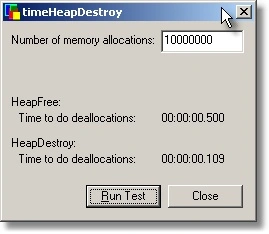Delete memory 5 times faster
The conventional way
Memory management in C and C++ is typically done using either the malloc/realloc/free C runtime functions or the C++ operators new and delete. Typically the C++ operators call down to the underlying malloc/free implementation to do the actual memory allocations.
This is great, it’s useful, and it works.
But it puts all the allocations in the same heap. So when you come around to deallocating the heap manager will need to take into account all the other objects and allocations that are also in the heap but unrelated to the data you are deallocating. That adds overhead to the heap manager, causing memory fragmentation and slower heap management.
An alternative way
There is a different way you can handle this situation – you can use your own heap for a given group of allocations.
HANDLE hHeap; hHeap = HeapCreate(0, 0x00010000, 0); // 64K growable heap
The downside to this is that you have to remember to use the correct allocators and deallocators for these objects and not to use malloc/free etc. You can mitigate this in C++ by overriding new/delete to use your own heap.
void *myClass::operator new(size_t size)
{
return HeapAlloc(hHeap, 0, size);
}
void myClass::operator delete(void *ptr)
{
HeapFree(hHeap, 0, ptr);
}
The upside to this technique is that you can delete all your deallocations in one call by deleting the heap and not bothering with deleting individual allocations. This is also about 5 times faster.
Old style:
for(i = 0; i < count; i++)
{
HeapFree(hHeap, 0, ptrs[i]);
}
New style:
HeapDestroy(hHeap); hHeap = NULL;
There is another benefit to this technique: By deleting the heap and then re-creating a heap for new allocations you remove all memory fragmentation from the heap and start the new heap with 0% memory fragmentation.

Download the source of the demonstration application. Project and solution files for Visual Studio 6.0 and Visual Studio 2008 are provided.
We use this technique for some of our tools where we want a high-performance heap and zero memory fragmentation.
You will also want to ensure that whatever software tool you are using to monitor memory allocations will mark all entries in a heap that is destroyed as deallocated.